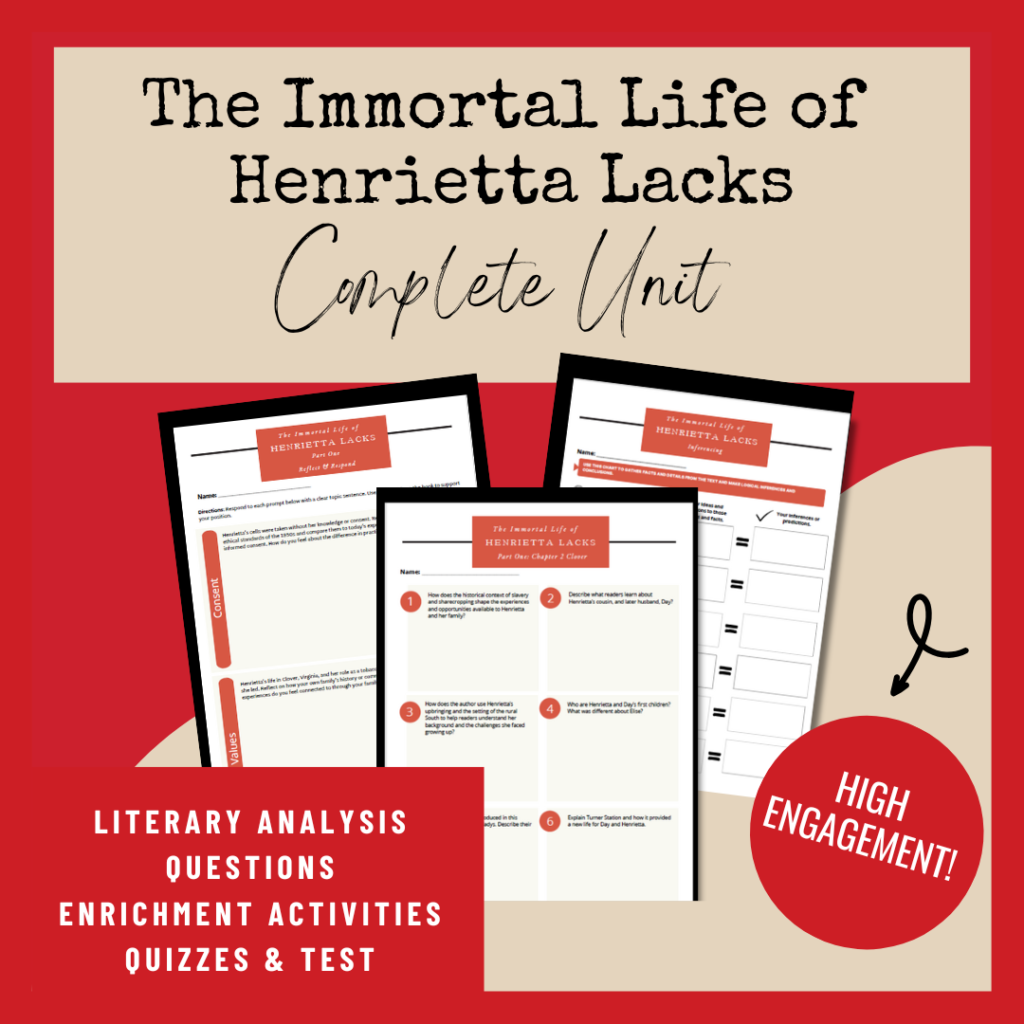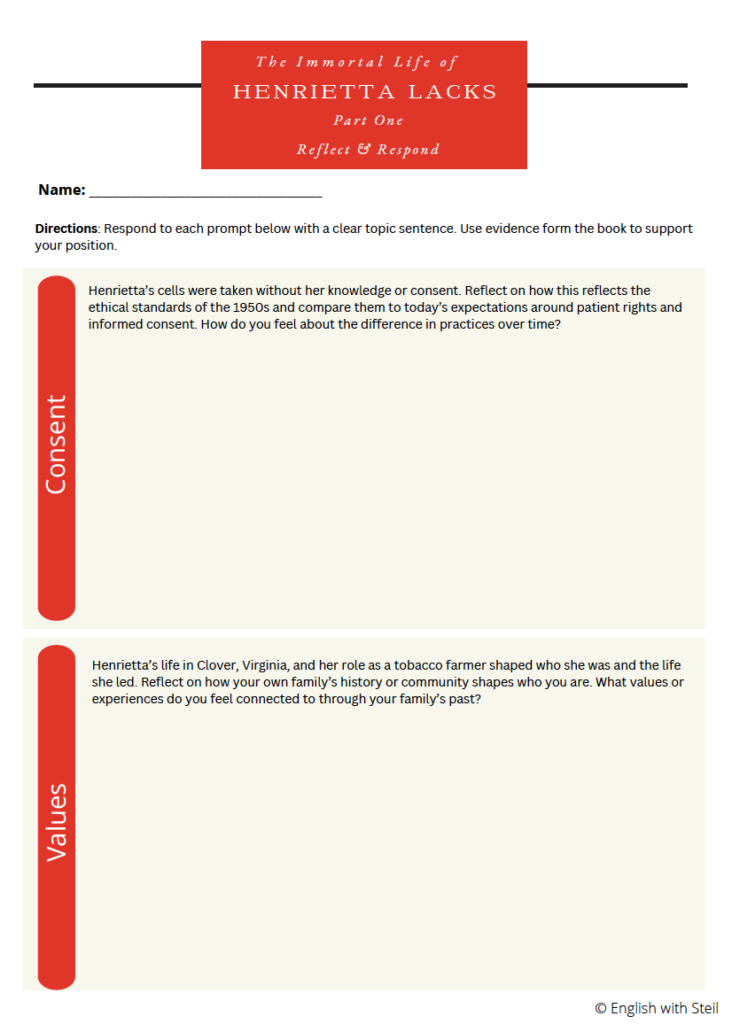The Immortal Life of Henrietta Lacks by Rebecca Skloot is a book that combines biography, science, and ethics, introducing readers to Henrietta Lacks, an African American woman whose cells (known as HeLa cells) transformed modern medicine. Henrietta’s cells were taken without her knowledge in the 1950s, a time when medical consent, especially for Black patients, was often overlooked. Her “immortal” cells went on to help develop the polio vaccine, cancer treatments, gene mapping, and more. But the story of how Henrietta’s cells were used without her consent raises questions that echo through generations of her family, impacting them deeply and shedding light on injustices in medical research.
Author Rebecca Skloot, a science writer, dedicated over a decade to researching and writing The Immortal Life of Henrietta Lacks. Her interest in Henrietta’s story began in a biology class, where her teacher mentioned HeLa cells but not the woman behind them. Driven by curiosity and a passion for exploring ethical issues in science, Skloot interviewed members of the Lacks family, navigated ethical dilemmas, and conducted extensive historical research. The result is a beautifully crafted narrative that combines Henrietta’s life story with larger questions about medical ethics, race, and scientific progress.
About the Author and Her Journey to Write the Book
The Immortal Life of Henrietta Lacks is a rich, multi-layered text that brings together science, history, ethics, and human resilience, making it a uniquely powerful book for students. Here are a few compelling reasons to teach this book:
1. Exploring Ethical Questions in Science and Medicine
This book provides a nuanced look at the ethical dilemmas surrounding medical research, informed consent, and patient rights. Henrietta’s cells were taken without her knowledge, leading to groundbreaking scientific discoveries, but also raising serious questions about how and when consent is necessary. Teaching this book allows students to critically examine the balance between scientific progress and respect for individual rights, helping them develop their own perspectives on bioethics.
2. Understanding Race and Inequality in Healthcare
The Immortal Life of Henrietta Lacks highlights racial and socioeconomic disparities in healthcare, especially in the mid-20th century. Henrietta’s story is part of a larger history of medical exploitation of marginalized communities. Through this book, students can discuss how historical injustices shape the mistrust that some communities feel toward the healthcare system, and consider the lasting impact of these issues on society today.
3. Humanizing Science and Recognizing Personal Stories Behind Data
Henrietta’s story brings a personal, human aspect to science, reminding us that behind every scientific discovery are real lives and families. Students often see science as abstract or impersonal, but this book connects them emotionally to the subject, making them think about the people behind scientific advancements. It’s a powerful way to bridge the gap between science and empathy, encouraging students to consider the human side of research.
4. Developing Critical Thinking on Media Representation and Journalism Ethics
Rebecca Skloot’s approach to telling Henrietta’s story offers lessons on journalism ethics, including sensitivity, accuracy, and respect for subjects’ lives. As students read about Skloot’s journey in earning the Lacks family’s trust, they see the importance of ethical journalism, the role of the media in shaping legacies, and the responsibilities of telling others’ stories accurately and compassionately.
5. Empowering Discussions on Legacy, Identity, and Family
The themes of legacy and family are central to the Lacks family’s journey. Deborah Lacks, Henrietta’s daughter, spends much of her life searching for answers and connection with her mother. Students can reflect on the importance of family histories and legacies, examining how people seek to understand their roots and honor their loved ones, especially in challenging circumstances.
Key Themes to Explore in the Classroom
Ethics and Consent in Medical Research:
Henrietta’s cells were taken without her permission, raising questions about consent, privacy, and the rights of patients. Discuss how these issues have evolved and the ongoing challenges in medical ethics today.
2. The Intersection of Race, Health, and Injustice:
Henrietta’s story highlights the racial inequalities in healthcare, particularly in the mid-20th century. This theme is powerful for understanding how marginalized groups have historically been treated by the medical community and how this impacts their trust in healthcare systems today.
3. Legacy and Identity:
The novel explores how Henrietta’s legacy continues to affect her family and the world. Students can consider how legacies are formed, remembered, and sometimes exploited, especially when the subject is seen as a “source” rather than a person.
4. The Role of Family and Memory:
Deborah Lacks, Henrietta’s daughter, plays a crucial role as she tries to learn about her mother’s impact while processing her family’s pain. Students can explore how family members remember, protect, and honor each other, even in the face of tragedy.
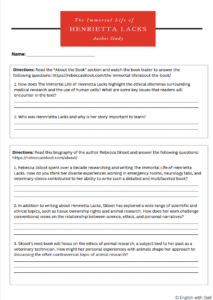
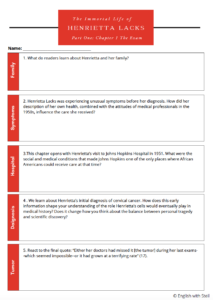
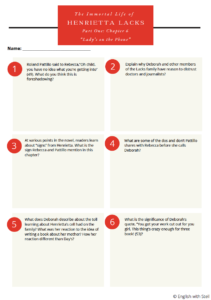
Creative Tips for Teaching This Novel
Create a “HeLa Legacy Museum” Project: Students can collaborate to create a virtual or physical “museum exhibit” dedicated to Henrietta Lacks. They could use visual displays, written reflections, timelines, and artworks that represent Henrietta’s life, HeLa cells’ scientific contributions, and the ethical questions the book raises. This project encourages research, creative expression, and empathy.
Role-Play Debate on Medical Ethics: Divide students into groups representing different stakeholders—doctors, scientists, the Lacks family, and policymakers—and hold a debate on medical ethics, using the issues raised by Henrietta’s story as a foundation. Students can discuss topics like informed consent, patient rights, and the balance between scientific progress and ethical responsibility. This helps students understand multiple perspectives.
Exploring Legacy Through Personal Storytelling: Encourage students to think about their own families and the legacies they would like to honor. Have them write short reflections or narratives about a family member whose story matters to them. This activity connects them personally to the theme of legacy, helping them empathize with the Lacks family’s desire to honor Henrietta.
Analyze Media and Public Perception: Skloot’s book also discusses how the media covered Henrietta’s story over the years, often sensationalizing or misrepresenting it. Have students examine articles, documentaries, or fictional portrayals of real-life medical cases. They can then discuss how media representation impacts public perception, understanding, and empathy.
Bioethics in Today’s World: Bring the story into the present by examining bioethics today. Students can research current issues in genetic research, DNA privacy, and the use of personal data in health studies. Discuss how these modern ethical questions relate to Henrietta’s story and how laws, attitudes, and protections have changed (or not) since her time.



Connections for Journalists in The Immortal Life of Henrietta Lacks
The Immortal Life of Henrietta Lacks offers powerful connections for journalists, highlighting the responsibilities and ethical challenges of reporting real human stories. The book’s journey reveals critical lessons on empathy, accuracy, and the pursuit of truth, making it an excellent resource for examining journalism’s role in telling ethically sensitive stories. Here are some key connections:
Ethics of Representation and Sensitivity in Storytelling: Rebecca Skloot’s approach to researching and writing about the Lacks family demonstrates the ethical responsibilities journalists hold. She builds trust with Henrietta’s family, listens to their perspectives, and respectfully navigates their pain and mistrust. This relationship underscores the importance of respecting subjects’ emotional boundaries, especially when covering marginalized voices or trauma.
Consent and Informed Permission in Reporting: Just as medical ethics demand informed consent, journalism requires thoughtful permissions, especially when handling sensitive or personal information. Skloot involved the Lacks family in her research and respected their wishes, which serves as a reminder for journalists to communicate openly, seek consent, and ensure that subjects understand how their stories will be presented.
Balancing Public Interest with Personal Privacy: Henrietta’s story highlights the delicate balance between serving public interest and protecting personal privacy. Journalists face similar dilemmas in stories where the subject’s legacy has scientific, social, or cultural significance. In these cases, it’s essential to weigh the story’s potential benefits to society against the individual’s right to privacy and dignity.
Combatting Stereotypes and Telling Nuanced Stories: Henrietta’s family, coming from a background of poverty and mistrust in medical institutions, could easily have been stereotyped or misunderstood. Skloot avoids this by presenting them as complex, multidimensional individuals with emotions, motivations, and histories. This approach is a valuable model for journalists, emphasizing the need to go beyond surface-level portrayals and seek out the full, nuanced stories of their subjects.
Accuracy and Accountability: The book reminds journalists of the critical importance of accuracy and accountability, especially in stories involving real people’s lives. Skloot’s thorough research, fact-checking, and commitment to getting details right demonstrate the lengths journalists should go to honor the truth of their subjects’ lives.
The Role of Journalists in Shaping Legacy: Journalism has the power to shape public perception and legacy, as seen in how Henrietta’s story was largely unknown until Skloot’s book. This responsibility means journalists must carefully consider how their portrayal will impact subjects and their families. The Lacks family’s complicated legacy—one that blends scientific importance with personal pain—reminds journalists to approach every story with a deep respect for its long-term impact on real lives.
Final Thoughts
The Immortal Life of Henrietta Lacks offers a profound exploration of science, history, and human rights. Teaching this book with creativity and sensitivity provides students a window into the ethical complexities of medical research, the human side of scientific progress, and the powerful impact of honoring individual stories. Through this novel, students can gain insight into the importance of legacy, empathy, and ethics—and perhaps be inspired to advocate for fairness and dignity in whatever fields they pursue.
